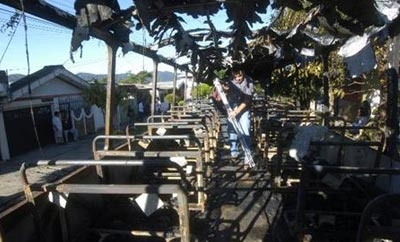Salvadoran police warn that extortion by gangs has risen since a nationwide truce between the MS-13 and Barrio 18 was brokered a year ago, raising concerns about the long term viability of the deal.
Police sources consulted by newspaper El Diario de Hoy said while the number of reported extortions had dropped, the real figure seemed to have shot up, and that gang members were using new methods.
Mara Salvatrucha (MS-13) and Barrio 18 have agreed to stop extortion in designated “peace zones” in the next phase of the truce, but Justice and Security Minister David Munguia Payes admitted to El Diario de Hoy that extortion would not stop while unemployment remained high.
Only 10 percent of extortion victims filed reports, said police investigators, while many stayed silent for fear of reprisals. Extortion payments were factored into company budgets, they said, citing the example of a business in Soyapango paying $27,000 a month to gangs.
Children aged between 10 and 13 are often used as messengers, according to security advisers employed by businesses, who told the newspaper that they arrived with threatening notes or cellphones allowing gang members to talk directly with company managers. Police said the gangs made an average of 75 calls a day to potential victims, mostly from jail.
Munguia told El Diario de Hoy that the fact that an agreement had not been reached with the gangs on extortion was one of the “imperfections” of the truce. “The gangs have already said that they are not going to stop extorting, because that is how they make a living, at least until they have an alternative way of making money,” said the minister.
InSight Crime Analysis
While El Salvador’s gang truce has been widely lauded as a success, with homicides dropping more than 40 percent since it was agreed in 2012, there are questions over the viability of proposed new peace zones, and extortion is a major sticking point. As Munguia acknowledged, extortion is the main source of income for the gangs and as such will be difficult to eradicate.
Gang leaders have agreed to stop all criminal activities in designated peace zones, four of which have been inaugurated so far, with another 10 planned, but the lack of clarity about how the zones will work in practice is a cause for concern.
Both the government and gang leaders have made clear that extortion will not stop until there are more job opportunities for the gang members, but so far these have failed to materialize. The government has announced plans to give tens of thousands of gang members and “at risk” youth job training and opportunities with participating companies, but gang members have complained that so far authorities have not made good on their promises.

